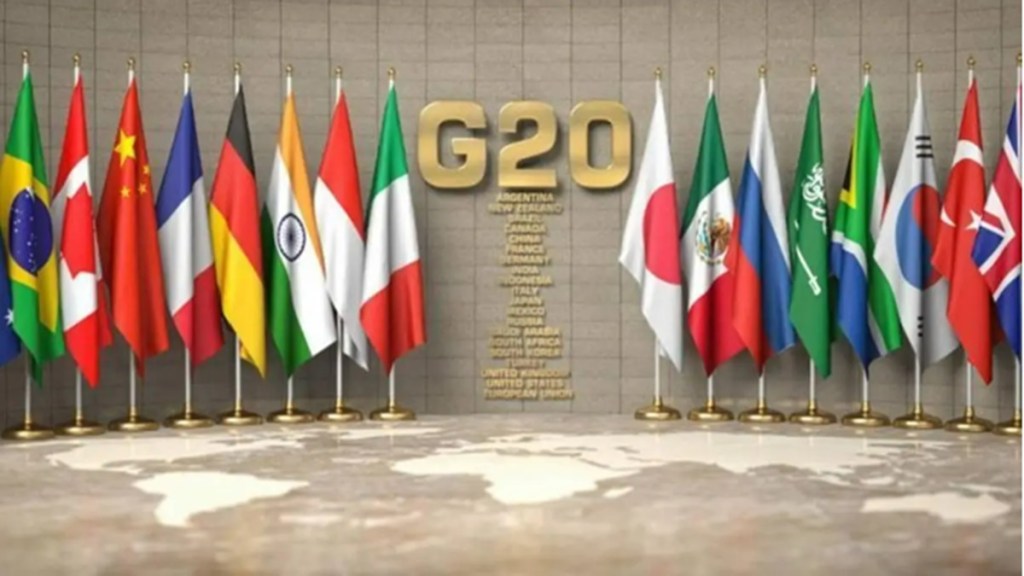The two-day meeting of Finance Ministers and Central Bank Governors (FMCBG) of the G20 countries concluded here on Tuesday, endorsing a road map for enhanced lending capabilities of MDBs, the need to address debt vulnerabilities and a coordinated risk-based regulatory framework cryptos.
However, the deliberations could not produce a joint communique, given the differences between the G7 segment and Russia on how to describe the Ukraine conflict.
“Chair statement (rather than joint communique) is because we still don’t have a common language on the Russia-Ukraine war. Our position since February (Bengaluru FMCBG) has been that we derive the statement from Bali leaders’ statement,” Union finance minister Nirmala Sitharaman said.
Another issue, where no consensus could be reached was global food and energy prices. Several G20 members condemned Russia for quitting the Black Sea grain deal that allowed the safe export of grain from Ukraine.
As for the implementation of the OECD/G20 two-pillar international tax package, the G20 ministers welcomed the text of the convention that prescribes reallocation of MNCs’ profits to jurisdictions they operate, and the “significant progress” of work to simplify tax administration.
On the issue of debt relief to the most vulnerable countries, which India pressed for as the chair, some headway was achieved with China extending its support to the resolution mechanism being worked on.
“Beyond the Common Framework, we welcome all efforts for timely resolution of the debt situation of Sri Lanka, including the formation of the official creditor committee, and we call for the resolution as soon as possible,” the statement said.
The ministers and central bank governors noted that global economic growth is below its long-run average and remains uneven. “With notable tightening in global financial conditions, which could worsen debt vulnerabilities, persistent inflation and geoeconomic tensions, the balance of risks remains tilted to the downside. We, therefore, reiterate the need for well-calibrated monetary, fiscal, financial, and structural policies to promote growth, reduce inequalities and maintain macroeconomic and financial stability,” said the G20 Outcome Document and Chair’s Summary.
The G20 finance chiefs also endorsed the Independent Review of MDBs Capital Adequacy Frameworks (CAFs). “We take note that initial CAF measures, including those under implementation and consideration, could potentially yield additional lending headroom of approximately $200 billion over the next decade,” it said.
The group also discussed the use of Central Bank Digital Currency in cross-border payments. “With regard to cross-border payments, it was recognised that there is great potential for CBDC to facilitate easier, smoother and seamless cross-border payments. There is a need to take this agenda forward,” RBI governor Shaktikanta Das said.
The group of countries, which represents 85% of the world GDP, endorsed the Financial Stability Board’s high-level recommendations for the regulation, supervision and oversight of crypto-assets activities and markets and of global stablecoin arrangements. “We look forward to receiving the IMF-FSB synthesis Paper, including a road map, before the Leaders’ Summit in September 2023, to support a coordinated and comprehensive policy and regulatory framework taking into account the full range of risks, and risks specific to the emerging market and developing economies (EMDEs) and ongoing global implementation of FATF standards to address money laundering and terrorism financing risks.”
Sitharaman said India brought onto the table the issue of digital public infrastructure (DPI).
“The Indian presidency has brought the digital public infrastructure (DPI) agenda into the G20 discussions. Members endorsed the transformative role of DPI in rapidly advancing financial inclusion and productivity gains,” she said.
On global debt vulnerabilities, G20 members actively deliberated on how to strengthen multilateral coordination to effectively address the deteriorating debt situation and facilitate coordinated debt treatment for debt-distressed countries, said the finance minister.
Asked about Beijing’s response to evolving a common debt resolution mechanism, she said, “China’s stand was encouraging.”
